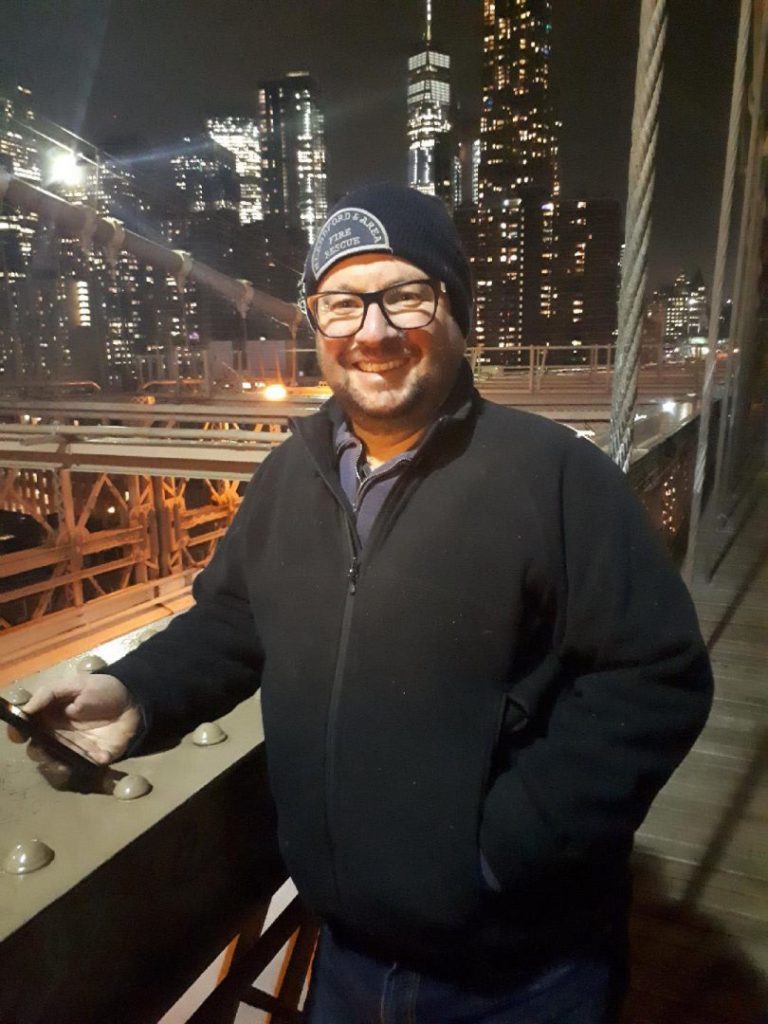“Publishing is the most competitive business on the planet,” George Gibson says. An executive editor with Grove Atlantic, Gibson has edited bestsellers including Longitude and Salt. He’s one of the guests invited by the King’s Master of Fine Arts in Creative Nonfiction program to help students navigate that world during a week-long residency in New York, held at Pace University in the city’s Financial District.

Phillip Moscovitch is in his second year of the King’s MFA program. He’s been a freelance writer for 20 years. Photo: Sara Lamb
The only program of its kind in Canada, the two-year MFA combines four intensive residency periods with in-depth mentorship relationships. Summer residencies take place at King’s, while January sessions alternate between Toronto and New York—North America’s two major publishing centres.
As a second-year student graduating (I hope) in spring, this is my final residency.
I came into this program 20 years into a career as a freelance writer. While I had lots of writing experience, I knew next to nothing about the book business, or the nuts and bolts of what it takes to write book-length narrative nonfiction. What makes the MFA so good is its hands-on, practical approach, and the way it draws on the experience of top people in the industry—editors, writers, agents—who are happy to share their knowledge with our group. At the end of the week, we all pitch our writing projects to agents and/or editors. You go into these sessions looking for feedback, but sometimes you get more: Last year’s Toronto pitch sessions led directly to book contracts for a couple of students.
The sessions are a mix of writing craft, insights into the current state of the nonfiction book business (sales are good and audiobooks are wildly popular), and practical advice on subjects like negotiating a book contract and having an author website that works.
You go into these sessions looking for feedback, but sometimes you get more: Last year’s Toronto pitch sessions led directly to book contracts for a couple of students.
We started things off with Sean Cole, a radio producer best known for his work with This American Life, and his audio-clip-filled presentation on when and how to insert yourself into the story—always a tricky consideration when it comes to writing nonfiction. Ex-pat Canadian Clive Thompson, who writes regularly for Wired and The New York Times Magazine, offered insights into why his pitches used to suck and how to pitch better. And Fariha Roisin, who has an astounding three books in the works (one poetry, one fiction, one non-fiction) decided to go off-script. Instead of giving a talk on “Writing for the Internet” she led a thoughtful and sometimes emotional discussion on our motivations as writers, likability (what it is and if it’s important) and our attachments to our projects.
‘If you have an instinct to insert yourself into the story, don’t shy away from it.’ Advice to writers from @ThisAmerLife producer Sean Cole at the @kings_mfa 2019 Winter Residency in NYC. @ittycity @ukings @kingsjournalism #writinglife #writingtips #MFANYC
— Dean Jobb | Author (@DeanJobb) January 6, 2019
Listening to Clive Thompson @pomeranian99 talk about his early writing career in #Toronto as a prelude to his current career. @kings_mfa
— Amanda Lee (@LeeAmandaJ) January 7, 2019
Thank you @fariharoisin for jumpstarting an intense conversation about likability, memorability, redeemability, relatability, and respectability. Food for thought that will linger in my mind long after today’s session. @ukings @kings_mfa #NYC winter residency. pic.twitter.com/sTiPgTIW3M
— Margaret Lynch (@m_m_lynch) January 7, 2019
Agents and editors have sat down for frank Q&A sessions on what they look for, their process when it comes to acquiring books and editing manuscripts—and how a strong writer’s voice can win them over. Amy Gash, executive editor at Algonquin Books, passed around advance copies of books she edited on subjects she thought she had no interest in, including the lives of four spies active at the birth of the state of Israel, and the importance of craftsmanship. (She also joked that if you’re trying to sell memoir, “having had a really horrible childhood” helps.)
It’s not all classroom work of course. We’ve had field trips to the Amazon Bookstore, the legendary Strand Bookstore, and the Tenement Museum—which makes brilliant use of storytelling techniques we can apply as narrative non-fiction writers. And last night a group of students got to hone their performance chops with readings at the Bowery Poetry Studio.
Thursday is our last full day of lectures, followed by pitch sessions Friday, and then New Yorker staff writer Adam Gopnik will wrap things up on Saturday with a talk on connecting personal experiences with larger concerns.
Is it exhausting? Yes. But worth it? Absolutely.

